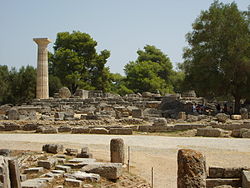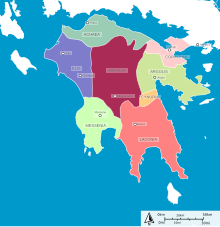Elis
Ἦλις | |
|---|---|
Region of Ancient Greece | |
 Ruins of the Temple of Zeus, Olympia | |
 | |
| Location | Peloponnese |
| Major cities | Elis, Olympia |
| Dialects | Doric |


Elis (/ˈiːlɪs/[1]) or Eleia /ɪˈlaɪ.ə/ (Greek: Ήλιδα, romanized: Ilida, Attic Greek: Ἦλις, romanized: Ēlis /ɛ̂ːlis/; Elean: Ϝᾶλις /wâːlis/, ethnonym: Ϝᾱλείοι[2]) is an ancient district in Greece that corresponds to the modern regional unit of Elis.
Elis is in southern Greece on the Peloponnese, bounded on the north by Achaea, east by Arcadia, south by Messenia, and west by the Ionian Sea. Over the course of the archaic and classical periods, the polis "city-state" of Elis controlled much of the region of Elis, most probably through unequal treaties with other cities; many inhabitants of Elis were Perioeci—autonomous free non-citizens. Perioeci, unlike other Spartans, could travel freely between cities.[3] Thus the polis of Elis was formed.
The local form of the name was Valis, or Valeia, and its meaning, in all probability was, "the lowland" (compare with the word "valley").[4] In its physical constitution Elis is similar to Achaea and Arcadia; its mountains are mere offshoots of the Arcadian highlands, and its principal rivers are fed by Arcadian springs.[5]
According to Strabo,[6] the first settlement was created by Oxylus the Aetolian who invaded there and subjugated the residents. The city of Elis underwent synoecism—as Strabo notes—in 471 BC.[7] Elis held authority over the site of Olympia and the Olympic games.
The spirit of the games had influenced the formation of the market: apart from the bouleuterion, the place the boule "citizen's council" met, which was in one of the gymnasia, most of the other buildings were related to the games, including two gymnasia, a palaestra, and the House of the Hellanodikai.[citation needed]
- ^ Wells, John C. (2000) [1990]. Longman Pronunciation Dictionary (new ed.). Harlow, England: Longman. p. 254. ISBN 978-0-582-36467-7.
- ^ Miller, D. Gary (2014). Ancient Greek Dialects and Early Authors: Introduction to the Dialect Mixture in Homer, with Notes on Lyric and Herodotus. De Gruyter. p. 185. ISBN 978-1-61451-295-0.
- ^ Roy, J. "The Perioikoi of Elis." The Polis as an Urban Centre and as a Political Community. Ed. M.H. Hansen. Acts of the Copenhagen Polis Centre 4. Copenhagen: Det Kongelige Danske Videnskabernes Selskab, Historisk-filosofiske Meddelelser 75, 1997. 282-32
- ^ Smith, William (1854). "Elis". Dictionary of Greek and Roman Geography. Perseus Digital Library.
- ^ One or more of the preceding sentences incorporates text from a publication now in the public domain: Chisholm, Hugh, ed. (1911). "Elis". Encyclopædia Britannica. Vol. 9 (11th ed.). Cambridge University Press. p. 278.
- ^ Strabo Geographica Book 8.3.30
- ^ Roy, J. (2002). "The Synoikism of Elis". In Nielsen, T. H. (ed.). Even More Studies in the Ancient Greek Polis. Stuttgart: Steiner. pp. 249–264. ISBN 3-515-08102-X.